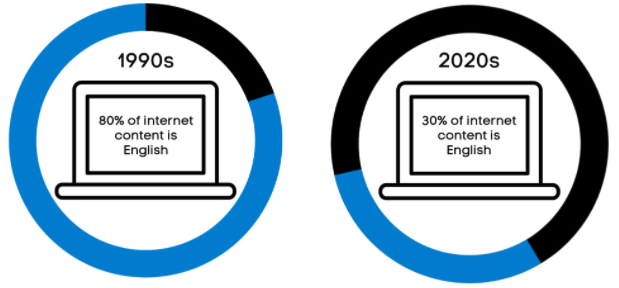English, the once dominant language, accounting for over 80% of content during the Internets’ formative years in the 1990s, has now dropped to around 30%. In today’s global and multi-lingual world, people are communicating on the internet not only in English, but a multitude of languages. Top languages in use on the internet now include French, Spanish, German and Chinese. Of an estimated 6,000 languages in use today around the world, the top 10 make up 82% of total content on the internet.

Top 10 Languages in Use on the Internet
- English
- Chinese
- Spanish
- Arabic
- Portuguese
- Japanese
- Russian
- German
- French
- Malaysian
Why is Multi-Language Filtering Important
The online world is no longer as English dominant as in the past. Businesses, education, and governments need reliable filtering that supports their native language as well as English. Students and employees will often find ways of bypassing filters to access blocked or potentially inappropriate websites. Bypass techniques using translation services like Google or Microsoft Translator can change whole website URLs or keyword searches into another language, with the translation then used to access a site. Instances like this are often missed by filtering solution that pay less attention to non-English content. When considering a web filter, it is essential to know how well it can categorize search terms in multiple languages as well as the ability to filter based on international domain names.
Multi-Language Filtering with Netsweeper
Netsweeper supports 47 languages including the top 10 that make up over 80% of content on the internet today. The Netsweeper platform goes beyond this list. From German to Dutch or Serbian to Thai the current set of languages is actively supported and always being improved. Consistent monitoring occurs to identify trends in language classification. As new customers come online in new regions and as internet content constantly changes, Netsweeper adjusts and deploys new language support into production.
Global Events Require Multi-Language Filtering
With the current events taking place between Russia and Ukraine searches for information may bring up images of war not suitable for kids. Netsweeper supports filtering in Russian, Polish and Romanian, which all may lead to inappropriate content for children when searched in those languages.
In some cases, students learning about global affairs or attending civics classes may need access to current news. Netsweeper gives teachers the ability to override specific filters for online content and grant temporary access for educational use. This will allow students to see what’s needed during class time and return to set filtering standards afterwards.
Learn More
A robust content filter that can handle multiple languages is crucial as the internet continues to evolve rapidly. Netsweeper has more than double the number of languages being filtered than any other solutions available in the market. Check out our Live Stats page to see our filtering in action!
To learn more about Netsweeper’s filtering solutions, meet with one of our solutions specialists
